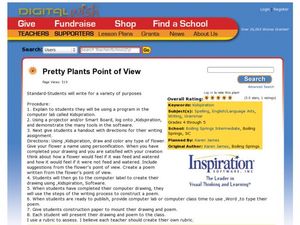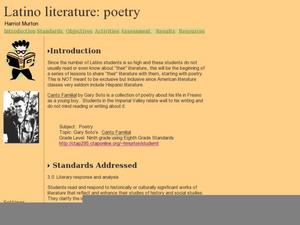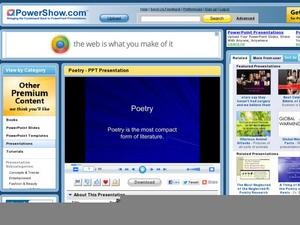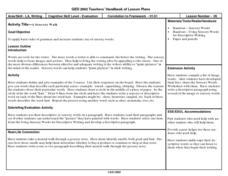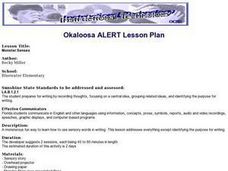Curated OER
Pretty Plants Point of View
Young poets use Kidspiration to draw a flower, personify the flower, and write a poem from the flower's point of view. Sharing these poems in small groups will reinforce learners' knowledge of personification.
Curated OER
Similes with Energy
Fifth graders write or dance a simile to show the relationship between two unlike nouns. In this simile and grammar lesson, 5th graders explore dance movements and identify smooth and sharp energy examples. Students review similes and...
Curated OER
I Am, Am Not! Project
Get your class writing with this project idea. Kids choose two pictures of objects that are like them and two pictures of objects that are not like them to entice their readers. Then, they write an informative paragraph describing each...
Curated OER
The Personal Narrative - Part Two
Does your langauge arts class journal frequently? Extend one of your journaling activities by having your writers choose a journal entry and take it through the five stages of writing. They will use the attached graphic organizer to...
Curated OER
Similes and Metaphors
What is a simile? What is a metaphor? How are both of these different? First, discuss the difference between the two terms, and then have your emerging writers practice identifying sentences that use either literary device. They are also...
Curated OER
Fairy Tale Similes
Discuss similes in fairy tales using a simple worksheet. Learners take a look at the fairy tales they have read, talk about the definition of a simile, and list examples. Then, they create an illustration for one of the similes they have...
Curated OER
Like Water for Chocolate: Family Tradition
Engage young writers in family tradition with this writing assignment for Like Water for Chocolate, by Laura Esquivel. Using sensory details, learners write a narrative about a family tradition involving food. Scholars also talk with...
Curated OER
Like Water for Chocolate Guided Reading Worksheet
Planning a novel unit on Like Water for Chocolate by Laura Esquivel? If so, this comprehensive guided reading worksheet might appeal to you. Steer readers through the entire novel with a routine of comprehension questions and analysis...
Curated OER
Latino Literature: Poetry
Under construction, this lesson focuses on Canto Familia, a collection of poetry about Gary Soto's experiences growing up in California's Imperial Valley. Representative of the experiences of many Latinos, the poems also address themes...
Curated OER
Learning Intentions
What a helpful resource! This presentation could be used to review literary terms in the classroom. Learners view a series of slides defining the meaning of terms, such as personification, imagery, similes, metaphors, and alliteration....
Curated OER
Writing a Character Description
Invoke creativity by using this resource on writing techniques. Learners create a description of a character they could use in their writing, focusing on the proper use of adjectives, similes, and metaphors. It's a great presentation for...
Curated OER
Myth-A People
How well do you know your Greek and Roman myths? Find out with these multiple-choice questions. Each question addresses a character in mythology. Choose who did what in this quiz!
Curated OER
Epic Poetry: Literary Terms for Story Analysis
What do Star Wars, Indiana Jones, and The Odyssey have in common? Why, they are all epics, of course, and are presented here as examples of the literary term. If you are beginning a study of epics, consider previewing the terms included...
Curated OER
Poetry: The Most Compact Form of Literature
Introducing or need to review literary devices and terms for a study of poetry? Though text heavy, the explanations and examples of key poetic devices will provide learners with the vocabulary they need to discuss and craft poems.
Curated OER
Lesson Plan 12: Writing With All Your Senses
What does an ice cream sundae sound like? Challenge young writers to move beyond visual descriptions and craft details that appeal to all five senses. The examples provided by the script in this resource show pupils how to create rich...
Curated OER
Personification #2
Langston Hughes’ poem, Fall Leaves, provides the text for a personification identification worksheet. Pupils underline examples of this literary device and then write an explanation of how it is used in the poem.
Tech Coach Corner
Poetry: It's Rhyme Time!
Define poetic devices and provide examples. The slides list information for rhyme, repetition, alliteration, simile, metaphor, free verse poetry, onomatopoeia, and patterned poetry. The animation and sounds are a bit distracting, and...
Curated OER
Pride and Prejudice: Concept/Vocabulary Analysis
Clarify the setting, literary themes, and potential vocabulary issues with a concept analysis resource. With thoughtful explanations of many parts of Jane Austen's Pride and Prejudice, the reference sheet will be a great addition to your...
Curated OER
Congruent Figures
Learners read and analyze "Congruent Figures," by Takahashi Takako. They participate in a literary circle discussion, complete reading log handouts, complete a pre- and post-reading survey, and conduct a debate.
Curated OER
Idiom Quizzes - XYZ
For this online interactive language skills worksheet, students answer 3 multiple choice questions regarding idioms. Students may check their answers immediately.
Curated OER
A Sensory Walk
Students define and give examples of five senses, compiling a list of sensory words to be used in a written descriptive paragraph.
Curated OER
Monster Senses
Second graders listen to a story that contains many sensory words to describe an object. They listen a second time using a signal to indicate when they hear a sensory word. They write a short story about a monster using appropriate...
Curated OER
"How to Eat a Poem"
Eighth graders write a poem showing what they know about metaphors, and non-literal language to express ideas, convey meaning, and create images after they read Eve Merriam's "How to Eat a Poem".
Curated OER
Forms of Poetry
Pupils identify distinguishing features of poetry. They identify and use literary terminology including symbol, theme, simile, and alliteration. They recognize the effects of language.
Other popular searches
- Figurative Language Poetry
- Figurative Language in Poems
- Figurative Language Quiz
- Figurative Language Project
- Imagery Figurative Language
- Figurative Language Lessons
- Using Figurative Language
- Figurative Language Worksheets
- Figurative Language Test
- Figurative Language in Poetry
- Figurative Language Vocabulary
- Figurative Language in Prose


